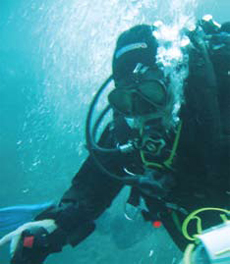




| Home | Features | Club Nights | Underwater Pics | Feedback | Non-Celebrity Diver | Events | 8 August 2025 |
| Blog | Archive | Medical FAQs | Competitions | Travel Offers | The Crew | Contact Us | MDC | LDC |

|

|
 
 |
 |
ISSUE 4 ARCHIVE - DIVING DENTISTCelehte FortuinQ: I got my open water a year ago but have not dived due to work reasons and need to get back into it. Problem is I have had most of my teeth removed and now have dentures, is that a problem with diving?A: My old professor used to start every lecture on dental prosthesis with what has now become many a dentist's motto: "Dentures are not a replacement for teeth, but a replacement for NO teeth!", usually followed by a long intake of breath, a dramatic pause (he thought) and a deep and meaningful stare. I have yet to come across a denture-wearing patient who disagrees. As far as diving with dentures are concerned the short is answer is: "no problem!". The materials that make up a denture (whether it be solely acrylic/ plastic or a combination of metal and acrylic) are generally inflexible and set at high pressure and temperatures that will easily withstand the usual rigours of diving. There are however a few other aspects you may need to consider. |
 |
|
The first is retention of the denture, i.e.,
how to make that baby stay where it was
designed to. Dentures are designed with
an area that creates a seal/vacuum onto
the gum surface. This happens due to
saliva moistening the fitting surface of
the denture and a small amount of air
being trapped between the gum and
denture creating a suction effect
(especially true for top denture) that
holds the denture in place. Kind of like
sucking a sweet and it gets stuck to
the roof of your mouth. A big complaint
amongst scuba divers is a dry mouth
during/after dives, the effect of breathing
dry air under pressure (this may become
less of an issue the more you dive and
the more relaxed you are under water).
Once this happens for you, the suction
effect could be lost and the denture
will have a tendency to start moving
around. Even with great fitting dentures
consider a fixative (in the form of powder,
gel, paste or cushioned pads) applied
to the fitting surface of your denture
whilst on dives.
|
||
|
Considering the length of time you'll
spend biting down on your regulator
during a dive, occlusal stability becomes
even more important. A snug fitting
prosthesis will resist tipping/tilting/
rocking when closing the teeth together
and moving the jaws from side to side,
sliding the teeth over each other. Any
instability should set off warning bells.
Added stress during the dive, as you try
to retain an unstable denture sufficiently
so as not to loose your regulator, is not
pleasant and you may, in addition,
surface with badly ulcerated gums
where the denture has been gnawing
away quietly (or maybe not so quietly!).
Ask the equipment guru at a good
dive shop about the different types
of mouthpieces available for your
regulator. A mouthpiece with a thin
biting surface that extends a little further
towards and along the back may be
very helpful.
During the construction of your denture a few added extras could greatly increase comfort and stability of your dentures. By strategically placing clasps around some of your natural teeth, the denture will be less likely move. A chrome-cobalt denture is generally the order of the day for a partially dentate patient. These tend to be lighter, thinner and smaller in frame and bulk, with fantastic aesthetics, greater comfort, much better retention and increased stability. If you have recently had this denture fitted and you still have some remaining teeth, your next question would no doubt have been "Is there ANYTHING other than this I could have to replace missing teeth? Roll on implantology. Titanium implants have changed the face of dentistry and is more readily available and affordable than many think. Small titanium screws are implanted (or placed or screwed) directly into the jawbone and come with a host of different connections that can be used for single crowns (like Titan the Triggerfish's very bling gold crown), porcelain bridges or even as retention screws for denture wearers to replace the missing teeth. If successfully placed and restored, you will experience stability and function akin to having natural teeth. No fear of discomfort and pain of the denture rubbing on the gums and above all the peace of mind that the prosthesis will not move during speech or function. I strongly advise you look into this option as this is certainly the way forward for replacing what you've lost – not only in function, but also in aesthetics, comfort and confidence. Safe diving and oh, before I forget, have I mentioned that you should still floss between your own natural remaining teeth? No? Well, if they are next to each other – happy flossing. Do you have burning dentistry issues? Celehte has all the answers. Chew your way through to the Contact page and send your query to the Diving Dentist. |
 | |
Previous article « Can I Dive With - Depression? Next article » Paul Toomer: Agony Aunt Back to Issue 4 Index | ||